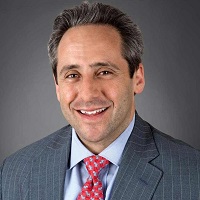For a Concentrated Stock Position, Ask Your Adviser This
There can be advantages to having a lot of stock in one company, but ‘de-risking’ can help avoid some significant disadvantages.


Profit and prosper with the best of Kiplinger's advice on investing, taxes, retirement, personal finance and much more. Delivered daily. Enter your email in the box and click Sign Me Up.
You are now subscribed
Your newsletter sign-up was successful
Want to add more newsletters?

Delivered daily
Kiplinger Today
Profit and prosper with the best of Kiplinger's advice on investing, taxes, retirement, personal finance and much more delivered daily. Smart money moves start here.

Sent five days a week
Kiplinger A Step Ahead
Get practical help to make better financial decisions in your everyday life, from spending to savings on top deals.

Delivered daily
Kiplinger Closing Bell
Get today's biggest financial and investing headlines delivered to your inbox every day the U.S. stock market is open.

Sent twice a week
Kiplinger Adviser Intel
Financial pros across the country share best practices and fresh tactics to preserve and grow your wealth.

Delivered weekly
Kiplinger Tax Tips
Trim your federal and state tax bills with practical tax-planning and tax-cutting strategies.

Sent twice a week
Kiplinger Retirement Tips
Your twice-a-week guide to planning and enjoying a financially secure and richly rewarding retirement

Sent bimonthly.
Kiplinger Adviser Angle
Insights for advisers, wealth managers and other financial professionals.

Sent twice a week
Kiplinger Investing Weekly
Your twice-a-week roundup of promising stocks, funds, companies and industries you should consider, ones you should avoid, and why.

Sent weekly for six weeks
Kiplinger Invest for Retirement
Your step-by-step six-part series on how to invest for retirement, from devising a successful strategy to exactly which investments to choose.
Market volatility, inflation and the pandemic have all amplified the need for investors to mitigate portfolio risks. Amid these factors, it’s vital to evaluate whether a disproportionately large portion of your portfolio is invested in any single stock — also known as a concentrated stock position.
While this investing approach isn’t always a negative, it can leave investors open to significant risk and potentially significant losses. Here are some key questions to ask your financial adviser when it comes to concentrated stock positions:
What are the general pros and cons of concentrated stock positions?
From just $107.88 $24.99 for Kiplinger Personal Finance
Become a smarter, better informed investor. Subscribe from just $107.88 $24.99, plus get up to 4 Special Issues

Sign up for Kiplinger’s Free Newsletters
Profit and prosper with the best of expert advice on investing, taxes, retirement, personal finance and more - straight to your e-mail.
Profit and prosper with the best of expert advice - straight to your e-mail.
While highly concentrated stock positions have created significant wealth for many investors, including some of the world’s wealthiest people (think Elon Musk, Jeff Bezos, Bill Gates, Warren Buffett and Larry Ellison), they can also produce the opposite effect.
It’s natural to be fascinated by the possibility that meteoric growth in a single holding could drastically increase your net worth, but also important to remember that concentrated positions can dramatically decrease your wealth. This is why diversification and “de-risking” techniques are critical components of most investing strategies.
Are there any legal restrictions related to the sale of concentrated stock ownership?
The SEC has rules to regulate stock sales by corporate insiders — generally officers and directors, as well as employees who have earned the stock as part of their compensation package. Typically, the “insider” can still sell some or all of the concentrated positions but needs to be aware of the applicable rules and transaction windows.
For example, 10b5-1 plans allow directors and officers to sell company stock during predetermined “open windows” that normally occur outside quarterly earnings announcements or the dissemination of other new information to the public that could cause the underlying stock price to change significantly.
What reasons might investors have to maintain concentrated stock positions?
Whether investors understand the risks of concentrated positions or not, there is often a strong tendency to hold on to them. This could be caused by fear of missing out on potential future gains, emotional attachment to the investment, overconfidence in the stock’s outlook, corporate pressure or even tax implications.
Another potential motivator is recency bias, where recent outperformance leads an investor to believe such results will indefinitely continue.
What steps can investors take to reduce the risk caused by concentrated positions?
There are many techniques investors who would like to stay somewhat invested in the stock can participate in, depending on their unique circumstances and goals.
- The most common technique is to reduce or eliminate exposure to the same sector in other facets of the portfolio.
- One of the most straightforward of these strategies is structured sales that span across multiple tax years. With this, investors can sell a fixed-dollar amount or percentage of the position over multiple tax years, allowing them to achieve concentrated risk reduction and spread out tax implications over many years.
- Tax-loss-harvesting equity strategies are also another popular risk-reduction tactic, as they provide investors with direct ownership of individual stocks in an indexlike solution and use a harvesting technique designed to reduce taxes and improve after-tax returns (aka tax alpha).
- Charitable gifting is another, less obvious strategy that investors can use to de-risk, as there’s the flexibility to contribute shares of appreciated stock directly to a charity, with the potential to deduct charitable contributions.
- To potentially see some instant diversification, investors might consider exchange funds, which allow qualified purchasers to exchange shares of their concentrated stock for an interest in a diversified fund that will hold shares of other companies.
- For those who do not want to sell their shares and instead are in a situation where they would like to hedge their position, option strategies could be a highly customizable choice to achieve virtually any hedge an investor desires.
Throughout my career, I’ve found that effective risk minimization can be achieved through a customized combination of the strategies listed above, but again it depends on the client’s circumstances and financial objectives. While it’s possible for a concentrated position to greatly enhance an investor’s net worth, de-risking the position can actually be more critical to long-term investing success.
Apollon Wealth Management, LLC (“Apollon Wealth”) provides advice and makes recommendations based on the specific needs and circumstances of each client. For clients with managed accounts, Apollon Wealth has discretionary authority over investment decisions. Investing involves risk and clients should carefully consider their own investment objectives and never rely on any single chart, graph, or marketing price to make decisions. The information contained herein is intended for information purposes only, is not a recommendation to buy or sell any security and should not be considered investment advice. Please contact your financial advisor with questions about your specific needs and circumstances.
Profit and prosper with the best of Kiplinger's advice on investing, taxes, retirement, personal finance and much more. Delivered daily. Enter your email in the box and click Sign Me Up.

Robert Gorman is a founding partner and Chief Operating Officer at Apollon Wealth Management, a collaborative and transparent financial planning firm focused on aligning clients’ goals of growing and preserving their hard-earned wealth. As one of the highest-decorated advisors in the field (ranking in the top 1%-2% in the nation by certification), Robert has taken the helm of building Apollon’s unique trading platform. A respected Principal/Wealth Management Advisor, Robert established his career at the Gorman Financial Group/Northwestern Mutual in 2004. Under his direction, the firm was voted “Best Financial Planner” by The Post and Courier and was a finalist for “Best Investment Firm” in 2016 and 2017.
-
 Dow Adds 1,206 Points to Top 50,000: Stock Market Today
Dow Adds 1,206 Points to Top 50,000: Stock Market TodayThe S&P 500 and Nasdaq also had strong finishes to a volatile week, with beaten-down tech stocks outperforming.
-
 Ask the Tax Editor: Federal Income Tax Deductions
Ask the Tax Editor: Federal Income Tax DeductionsAsk the Editor In this week's Ask the Editor Q&A, Joy Taylor answers questions on federal income tax deductions
-
 States With No-Fault Car Insurance Laws (and How No-Fault Car Insurance Works)
States With No-Fault Car Insurance Laws (and How No-Fault Car Insurance Works)A breakdown of the confusing rules around no-fault car insurance in every state where it exists.
-
 For the 2% Club, the Guardrails Approach and the 4% Rule Do Not Work: Here's What Works Instead
For the 2% Club, the Guardrails Approach and the 4% Rule Do Not Work: Here's What Works InsteadFor retirees with a pension, traditional withdrawal rules could be too restrictive. You need a tailored income plan that is much more flexible and realistic.
-
 Retiring Next Year? Now Is the Time to Start Designing What Your Retirement Will Look Like
Retiring Next Year? Now Is the Time to Start Designing What Your Retirement Will Look LikeThis is when you should be shifting your focus from growing your portfolio to designing an income and tax strategy that aligns your resources with your purpose.
-
 I'm a Financial Planner: This Layered Approach for Your Retirement Money Can Help Lower Your Stress
I'm a Financial Planner: This Layered Approach for Your Retirement Money Can Help Lower Your StressTo be confident about retirement, consider building a safety net by dividing assets into distinct layers and establishing a regular review process. Here's how.
-
 The 4 Estate Planning Documents Every High-Net-Worth Family Needs (Not Just a Will)
The 4 Estate Planning Documents Every High-Net-Worth Family Needs (Not Just a Will)The key to successful estate planning for HNW families isn't just drafting these four documents, but ensuring they're current and immediately accessible.
-
 Love and Legacy: What Couples Rarely Talk About (But Should)
Love and Legacy: What Couples Rarely Talk About (But Should)Couples who talk openly about finances, including estate planning, are more likely to head into retirement joyfully. How can you get the conversation going?
-
 How to Get the Fair Value for Your Shares When You Are in the Minority Vote on a Sale of Substantially All Corporate Assets
How to Get the Fair Value for Your Shares When You Are in the Minority Vote on a Sale of Substantially All Corporate AssetsWhen a sale of substantially all corporate assets is approved by majority vote, shareholders on the losing side of the vote should understand their rights.
-
 How to Add a Pet Trust to Your Estate Plan: Don't Leave Your Best Friend to Chance
How to Add a Pet Trust to Your Estate Plan: Don't Leave Your Best Friend to ChanceAdding a pet trust to your estate plan can ensure your pets are properly looked after when you're no longer able to care for them. This is how to go about it.
-
 Want to Avoid Leaving Chaos in Your Wake? Don't Leave Behind an Outdated Estate Plan
Want to Avoid Leaving Chaos in Your Wake? Don't Leave Behind an Outdated Estate PlanAn outdated or incomplete estate plan could cause confusion for those handling your affairs at a difficult time. This guide highlights what to update and when.